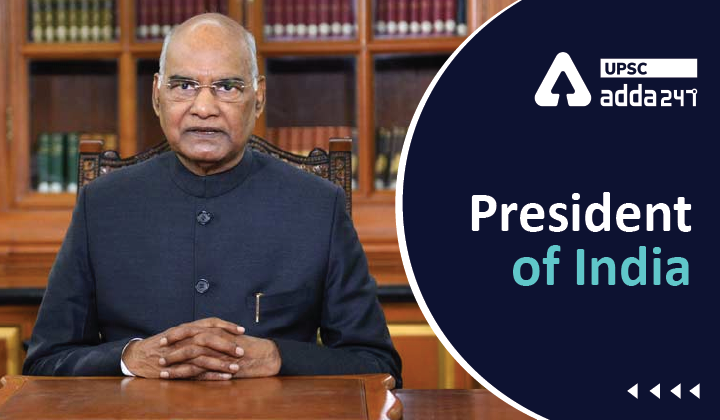Table of Contents
President of India- Relevance for UPSC Exam
- GS Paper 2: Indian Constitution- Historical underpinnings, evolution, features, amendments, significant provisions and basic structure.
President of India
- The President of India is the nominal head of the state of India. The President of India is also considered as the first citizen of the Indian State.
- President of India is a part of Union Executive along with the Vice-President, Prime Minister, Council of Ministers, and Attorney-General of India.
- Part V of the Constitution of India from Article 52 to Article 78 deals with the Union Executive under which also comes President of India.
- Article 52 of the Constitution of India states that ‘there shall be a President of India’.
Eligibility Criteria for the Candidates running for the Office of President of India
A Presidential candidate has to meet some qualifications for him/her to be elected as the president. The required qualifications for the office of president of India are:
- She/He should be an Indian Citizen
- She/His age should be a minimum of 35 years
- She/He should qualify the conditions to be elected as a member of the Lok Sabha
- She/He should not hold any office of profit under the central government, state government, or any public authority.
President’s Address to the Joint Sitting of Parliament
भारत के राष्ट्रपति (अनुच्छेद 52-62): भारत के राष्ट्रपति के संवैधानिक प्रावधान, योग्यता एवं निर्वाचन
Election of President of India
- Pre-requisite for the Election of President:
- The nomination of a candidate for election to the office of President must be subscribed by at least 50 electors as proposers and 50 electors as seconders.
- Every candidate has to make a security deposit of Rs. 15,000 in the RBI, which is liable to be forfeited in case the candidate fails to secure one-sixth of the votes polled.
- Principle of Election for President of India: The election of the President of India is based on the principle of Proportional Representation by means of a single transferable vote.
- Voting Method for the Election of President of India: It is a secret ballot system of voting.
- Electoral College for the Election of President of India: Article 54 states that the President of India shall be elected by the members of an electoral college consisting of-
- The elected members of both Houses of Parliament; and
- The elected members of the Legislative Assemblies of the States.
- Note: For the purpose of Article 54 and Article 55, “State” includes the National Capital Territory of Delhi and the Union territory of Pondicherry.
- Resolution of Disputes in Election of President: Any dispute related to the election of the President is taken up by the Supreme Court which has original jurisdiction in this case.
- In this case, SC’s decision is final.
- Note: After the election of the President is declared null and void, the acts done by the President in his office remain valid even after his removal.
- Constitutional Provisions for Election of President
Article Provisions
Article 55 Manner of election of President
Article 57 Eligibility for re-election
Who Do Not vote in the election of President of India?
- The following group of people is not part of the electoral college responsible for electing the President of India:
- Nominated Members of Lok Sabha (2) and Rajya Sabha (12)
- Nominated Members of State Legislative Assemblies
- Members of Legislative Councils (Both elected and nominated) in bicameral legislatures
- Nominated Members of union territories of Delhi and Puducherry
Value of Votes of Electoral Collage in the Election of President
- The value of the vote of an MLA = Total Population of the State/Total number of elected members in the state legislative assembly ×1/1000
- The value of the vote of an MP = Total Value of votes of all MLAs of all States/Total number of elected members of both Houses of Parliament
- The value of the vote of each MLA varies from state to state. However, the value of the votes of the MPs is the same.
President’s Address to the Joint Sitting of Parliament
Presidents of India List From 1947 to 2021 | Complete List of Indian Presidents
Presidents of India List From 1947 to 2021 | Complete List of Indian Presidents





 TSPSC Group 1 Question Paper 2024, Downl...
TSPSC Group 1 Question Paper 2024, Downl...
 TSPSC Group 1 Answer key 2024 Out, Downl...
TSPSC Group 1 Answer key 2024 Out, Downl...
 UPSC Prelims 2024 Question Paper, Downlo...
UPSC Prelims 2024 Question Paper, Downlo...





